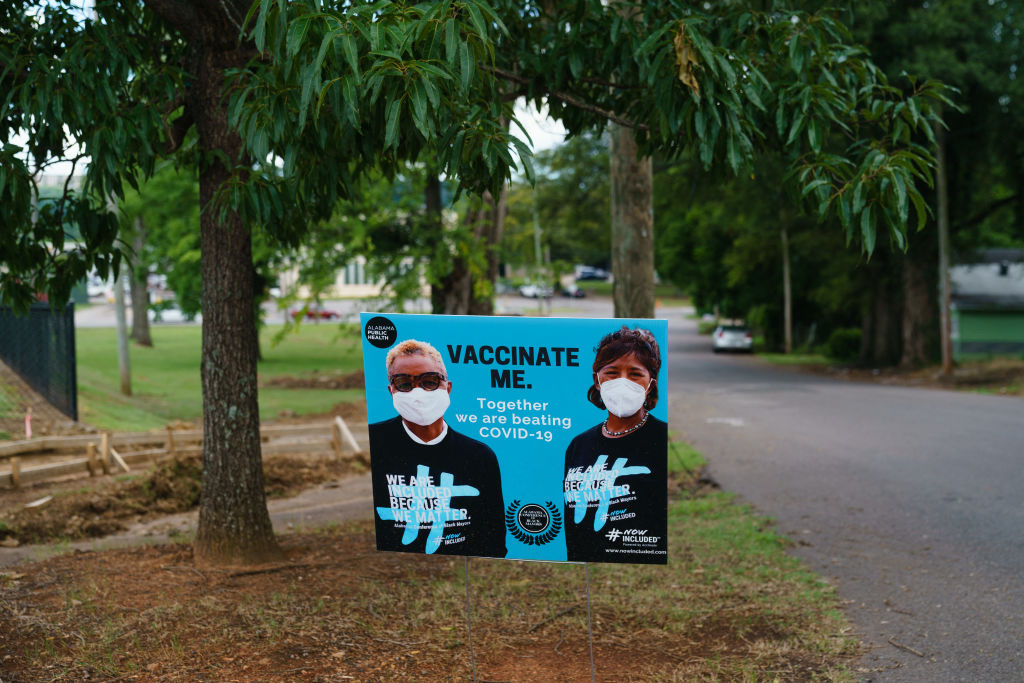Op-Ed: Why It’s Still Important To Listen To The Black Community’s Concerns Around Vaccine Hesitancy And Misinformation
A sign encouraging COVID-19 vaccination is seen outside a park on June 30, 2021, in Birmingham, Alabama. – A black minority suspicious of vaccines in general, and conservative white rural people convinced that the vaccine is more dangerous than Covid-19: Alabama and several southern states in the United States have among the lowest vaccination rates, making this deprived region an Achilles heel in the face of the coronavirus. | Source: ELIJAH NOUVELAGE / Getty
Conservative activist Charlie Kirk’s tweet implying that Buffalo Bills player Damar Hamlin’s tragic on-field collapse was linked to the COVID-19 vaccine drew swift and justified condemnation. It should also serve as a reminder that we have a long way to go in addressing vaccine hesitancy and misinformation.
As we enter the third year of the COVID-19 pandemic, around 68% of the country is fully vaccinated and only 34% are boosted, according to Centers for Disease Control and Prevention data. And while COVID-19 disproportionately impacted Black people in the United States, vaccination rates among Black individuals fell below other racial groups.
We should use this moment to examine these gaps, as we learn to live with the continued threat of COVID variants and the inevitable arrival of other highly contagious viruses.
Misinformation remains rampant concerning COVID-19 and the vaccines to combat it—especially on Twitter, fueling fears about the COVID-19 vaccination. In a single month, according to a recent New York Times article, Australian researchers were able to collect more than half a million conspiratorial and misleading English-language tweets about COVID-19. The tweets drew more than 1.6 million likes and 580,000 retweets.
Twitter is not the only tool used to spread COVID-19 misinformation. Social media platforms like TikTok, YouTube, and Facebook are also used, and are still discovering strategies to mitigate misinformation. While many have policies in place, social media companies should implement several actions that include but not limited to: updating social media algorithms, targeting harmful bots for removal, censoring sources, directing users to local health departments to access COVID-19 resources, and supporting recommendations from public health experts. A key strategy to addressing misinformation includes delving into where it starts, and when, why and how it is spreading which can be beneficial in future public health crises.
A recent study on the complex relationship between misinformation and COVID-19 vaccine hesitancy, published in the National Library of Medicine, revealed distrust of authorities, unforeseen future effects, personal freedom and COVID-19 denial as some of the factors for vaccine hesitancy.
As a Black researcher born and raised in Chicago—where a third of our population is Black—I am called to address the impact of COVID-19 in Black communities. False information can discredit the threat of COVID-19, fuel anti-virus conspiracy theories and further endanger a community already disproportionately impacted by the virus.
While public health officials work tirelessly to refute the various types of misinformation, a collaborative approach along with a focus on restoring trust within their communities is necessary. In working to restore trust, Oklahoma City found success in bolstering vaccination rates by changing their messaging strategy to replace “vaccinate” with “choose” in early 2022.
Public health officials should partner with health care providers, religion and government leaders, and social media corporations to address harmful misinformation. In fact, health care providers play a critical role in mediating conversations about vaccinations with their patients. To be fully effective, those partnerships should begin by talking with people who are vaccine hesitant to hear and understand their concerns.
In order to truly change behaviors and health outcomes, we have to be in dialogue with each other. Handing down advice, even when it’s scientifically sound, and expecting people to automatically follow it is an outdated practice—particularly in the face of so much misinformation.
As the leading qualitative nursing scientist of a large-scale study recently published through the Maternal Child Health Initiative, I found Black nurses experienced limited social support and significant stress. Their concerns were key in helping health systems update protocols and practices during the pandemic and beyond. But those changes started with listening.
In a recent review of evidence that I conducted with DePaul nursing colleagues, we identified Black Americans’ barriers to vaccination uptake include the following: mistrust of medical establishment, limited access to healthcare, inequitable access to resources and lower health literacy.
Strategies to combat those could include nurses who provide care to communities of color encouraging vaccinations and disseminating COVID-19 information based on credible evidence, while listening and addressing particular questions and concerns of their patients. This should be combined with using culturally inclusive informational materials, community outreach, investment in community-based organizations, and providing access to mobile vaccine clinics. Nurse researchers can build more representative clinical trial cohorts.
Vaccine hesitancy and misinformation are deeply entrenched, intertwined challenges. A deeper understanding of the issue of structural racism and the COVID-19 experience as lived by Black and brown people in the U.S. must be used to guide the way we steer people toward solutions that could save their lives.
Kashica Webber-Ritchey is an assistant professor at DePaul University’s school of nursing and a Public Voices fellow with The OpEd Project.
SEE ALSO:
Anti-Vax MAGA Republicans Try To Link Damar Hamlin’s Injury To His ‘Vaccine Status’
Notable NBA Players Who Are Against The COVID-19 Vaccine
The post Op-Ed: Why It’s Still Important To Listen To The Black Community’s Concerns Around Vaccine Hesitancy And Misinformation appeared first on NewsOne.

